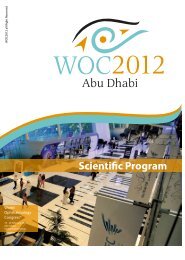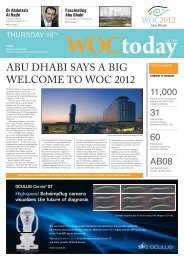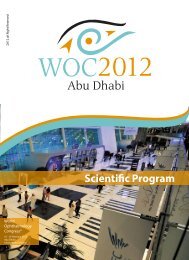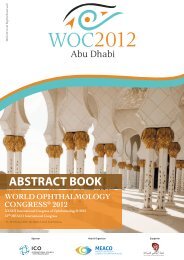Create successful ePaper yourself
Turn your PDF publications into a flip-book with our unique Google optimized e-Paper software.
CO-CAT-FR 100<br />
Fri 17 Feb 10:30 - 12:00<br />
Capital Suite 2<br />
Difficult Situations in Phacoemulsification<br />
of the Hard Cataract<br />
Presenters: Jeewan Titiyal, Namrata Sharma, Abhay Vasavada,<br />
Arup Chakrabarti<br />
Objective: To teach the novice surgeons who want to graduate<br />
from phacoemulsification surgery in simple cases to difficult<br />
cases. The principles of management of hard cataracts will be<br />
elucidated along with the surgical videos, which will demonstrate<br />
the possible problems and complications that can occur<br />
intraoperatively and the correct way to manage them.<br />
This course will highlight preoperative assessment, intraoperative<br />
considerations especially during capsulorhexis, hydromaneuvers,<br />
nuclear emulsification. Special attention will be given to<br />
Intraoperative problems faced during emulsification like<br />
incomplete separation, incomplete chop, absence of epinuclear<br />
cushion for protection of the posterior capsule, free-floating<br />
nucleus and last piece nuclear emulsification.<br />
Difficult situations in hard cataracts like small pupil / IFIS,<br />
subluxated cataract, pseudoexfoliation syndrome, posterior, polar<br />
cataract, post vitrectomy and posterior capsular tear during<br />
nuclear emulsification and when to convert to SICS or ECCE will<br />
be discussed and covered by appropriate video.<br />
Target Audience: General Ophthalmologists and Subspecialists<br />
Educational Level: Intermediate and Advanced<br />
CO-COR-FR 101<br />
Fri 17 Feb 10:30 - 12:00<br />
Capital Suite 4<br />
Descemet Stripping Endothelial<br />
Keratoplasty (DSEK) - Made Simple for<br />
the Beginners<br />
Presenters: Samar Basak, Jayangshu Sengupta<br />
Objective: This video-assisted instruction course will highlight<br />
the various steps of DSEK operation in depth. It includes donor<br />
button preparation in artificial anterior chamber, wound<br />
construction of the host, Descemet scoring and stripping,<br />
donor taco preparation, introduction and unfolding of taco at<br />
the anterior chamber, etc.<br />
The authors will highlight their experiences of DSEK in first 550<br />
cases with plenty of video clips in each step. It will also show the<br />
combined procedure of DSEK with Manual SICS or Phaco.<br />
Indications, contraindication, surgical complications, topography,<br />
Anterior segment OCT and specular microscopic findings are also<br />
included in this discussion.<br />
Course Summary:<br />
1. Introduction<br />
2. PLK Types: DLEK/DSEK/DSAEK/DMEK<br />
3. Case selection: indications and contraindications<br />
4. Basic Steps of Surgery<br />
a. Donor preparation in artificial anterior chamber<br />
b. Wound construction of recipient<br />
c. Descemet scoring and stripping of recipient<br />
d. Donor insertion into A/C<br />
e. Unfolding, centering and tamponade of donor lamella<br />
f. Closure of the incision<br />
g. Combined cataract surgery with DSEK<br />
5. Results and complications in first 550 cases after 3-60 months<br />
Target Audience: Subspecialists<br />
Educational Level: Intermediate<br />
CO-RET-FR 102<br />
Fri 17 Feb 10:30 - 12:00<br />
Capital Suite 8<br />
Posterior Segment Complications of<br />
Cataract Surgery<br />
Presenters: Mohamed El-Deeb, Ahmed Ibrahim<br />
Objective: On completing this course, the ophthalmologist<br />
should be able to:<br />
1. Describe the predisposing factors and early diagnostic signs<br />
of pseudophakic cystoid macular edema, dropped lens<br />
fragments, endophthalmitis and suprachoroidal haemorrhage.<br />
2. Identify the standard steps for prophylaxis and management<br />
of these complications as an anterior segment surgeon.<br />
3. Identify the surgical management that will be done by the<br />
retina specialists.<br />
Summary of Content: This course discusses the posterior<br />
segment complications of cataract surgery (pseudophakic<br />
cystoid macular edema, dropped lens fragments,<br />
endophthalmitis and suprachoroidal haemorrhage) focusing<br />
on the predisposing factors and presenting signs, which will<br />
enable the anterior segment surgeon to predict and diagnose<br />
these complications early. Also, it covers the prophylactic<br />
measures to avoid these complications and appropriate steps of<br />
management that can be done by the anterior segment surgeon.<br />
Lastly, it discusses treatment.<br />
Target Audience: Anterior segment Surgeons and Retina<br />
Specialists.<br />
Educational Level: Intermediate.<br />
CO-TRA-FR 103<br />
Fri 17 Feb 10:30 - 12:00<br />
Capital Suite 9<br />
Pars Plana Vitrectomy and Intraocular<br />
Lens Implantation for the Management<br />
of Luxated Crystalline Lenses<br />
Presenter: Wojciech Omulecki<br />
Objective: To present complex surgical techniques used for the<br />
management of luxated crystalline lenses.<br />
Summary of Content: Basic knowledge about crystalline lens<br />
luxation will be presented, including epidemiology, clinical<br />
signs, possible complications and treatment possibilities.<br />
Modern, complex techniques of surgery will be presented,<br />
including the use of pars plana vitrectomy, phacofragmentation,<br />
perfluorocarbon liquids, and simultaneous implantation of<br />
different types of intraocular lenses. Results and complications<br />
of the surgery will be presented.<br />
PowerPoint slides and video films will be used to illustrate the<br />
course subject.<br />
Target Audience: Subspecialists<br />
Educational Level: Intermediate and Advanced<br />
Friday, 17 February 2012<br />
43<br />
Hall 11






